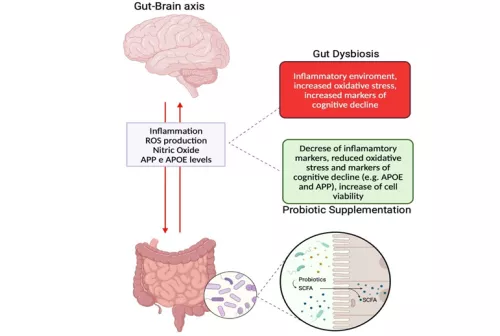The role of probiotics to improve mechanisms related to the protection of neuronal cells from oxidative conditions

Despite the identification of several innovative strategies to prevent cognitive decline, there is currently no single effective approach to minimize the deterioration of cognitive function. Recent studies suggest that the regulation of the strong connection between intestine and brain, with probiotics, is a potential therapeutic strategy to support brain health.

For this reason, Research Module 2 of the flagship project TINCARE wanted to characterized the effectiveness of a combination of probiotics based on B. bifidum, B.longum e L. Paracasei provided by Probionova SA (Lugano) to improve intestinal balance and consequently positively influence the brain. As is known, the intestine is considered the ''second brain'' as it has a nervous system directly connected with the brain that responds positively to gut health (enteric nervous system). This direct interaction between the intestine and the brain is very studied and it is called the gut-brain axis which is closely influenced by the enteric microbiota that lives in the intestine. The hypothesis of improving gut well-being to promote brain well-being is the basis for which the research group has axamined the ability of a new combination of probiotics to modulate intestinal barrier by setting up a study on 3D model that is representative of human physiological characteristics. The probiotic formulation under examination has not shown any harmful effects on the intestinal environment, demonstrating that such probiotics can be exploited to create a new orally-administered formulation in humans as they are safe and well-tolerated.

Another interesting asepct observed in the study is the presence of short-chain fatty acids (SCFA) produced by the new formulation and released into the plasma environment. They represent a crucial link between the gut and the brain, demonstrating and important role in the communication circuit between the two regions.
In fact, SCFAs are reduced to the plasma level in patients with several neuropsychiatric disorders, with Parkinson's disease or autism. The research group's results have demonstrated that butyric acid (a member of the short-chain fatty acids family) acts as a messenger to activate and support various mechanisms aimet at improving cognitive dysfunction, promoting anti-inflammatory and antioxidant effects. Therefore, this study suggest that for the maintenance of a healthy intestinal microbiota mediated by probiotic supplementation, such as B.Bifidum nova BBF7, B. Longum nova BLG2 e L. Paracasei TJB8, how it contributes to the maintenance of cognitive functions.
